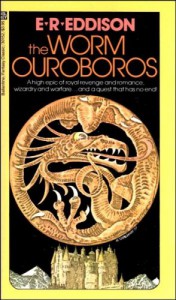 Why read The Worm Ouroboros?
Why read The Worm Ouroboros?Two reasons, chiefly. The first is that it’s fun; the second is that it’s a pleasure to read something whose author is so obviously in love with the English language, reveling in its intricacies.
To the first reason, if you’re looking for strong, character-driven plots or philosophical ruminations on Man’s condition, look elsewhere. Ouroboros is a celebration of the most pagan warrior virtues of the Western tradition. The basic story is the epic war between Demonland (the “good guys”), ruled by the brothers Juss, Spitfire and Goldry Bluszco, and Witchland (the “bad guys”), ruled by the deliciously wicked Gorice XII. Despite comparisons to Tolkien’s Middle Earth, Eddison’s ethos derives from Homer and the Norse Sagas stripped of their Christian veneer. Our heroes and our villains both are mighty and valiant fighters; and their women are uniformly fair. What sets the Demons and their allies apart is their sense of honor and a barbaric chivalry.
To the second reason: Eddison obviously loves English, most particularly Elizabethan English. Perhaps it’s because I have been reading and watching a lot of Shakespeare these last few months and my brain is more apt to translation than otherwise but I could wish our modern authors were as conscious and as careful and as exuberant in their prose as Eddison. An example taken entirely at random:
(p. 161).“Therewith he looked on the Demons, and there was that in his eyes that stayed their speech.
In a while he spake again, saying, `I sware unto you my furtherance if I prevailed. But now is mine army passed away as wax wasteth before the fire, and I wait the dark ferryman who tarrieth for no man. Yet, since never have I wrote mine obligations in sandy but in marble memories, and since victory is mine, receive these gifts: and first thou, O Brandoch Daha, my sword, since before thou wast of years eighteen thou wast accounted the mightiest among men-at-arms. Mightily may it avail thee, as me in time gone by. And unto thee, O Spitfire, I give this cloak. Old it is, yet may it stand thee in good stead, since this virtue it hath that he who weareth it shall not fall live into the hand of his enemies. Wear it for my sake. But unto thee, O Juss, give I no gift, for rich thou art of all good gifts: only my good will give I unto thee, ere earth gape for me’”
And this is the tenor for the next 400 pages. Despite that, the prose is very readable and if you can make it past the first chapter or two, the reading is worth the effort. Don’t get me wrong: I don’t want to encounter Elizabethan-style prose in every book I read but one of the things I don’t like about a lot of what passes for literature out there is the dull, turgid writing that ignores English’s rhythms, has its characters talk like denizens of the 21st century, and refuses to push the envelope in what English is capable of.
A third reason I enjoyed The Worm Ouroboros peculiar to myself is Eddison’s ear for names. Sometimes, he produces a real clunker like “Goldry Bluszco” but, on the whole, his instincts are true and when he names a character or a place it “feels” right – Gorice; Corsus, Corund & Corinius (Gorice’s chief generals); Lord Juss; Krothering Keep; Morna Moruna; Lady Mevrian; Carce; and so on.
The gods know I wouldn’t want to live in a world of Demons and Witches but I had a lot of fun vacationing there.


